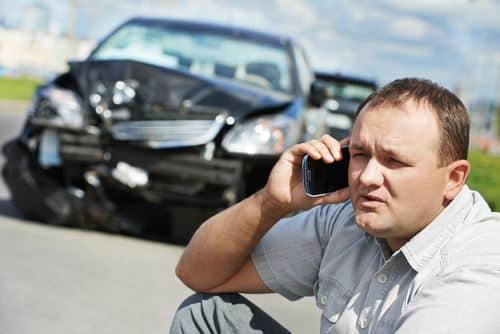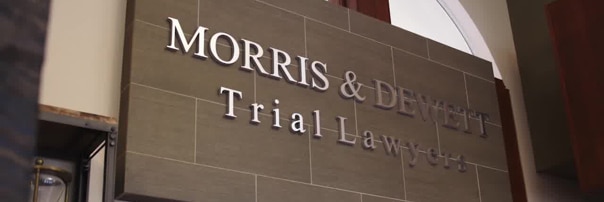Protect Your Rights & a Potential Car Accident Claim with These Key Steps
If you’re like the average driver, you can expect to be in at least four crashes over your lifetime. Unfortunately, the chances that one of those wrecks will end in injuries are pretty good. In fact, you have a one in three chance of being hurt in a car accident at some point in your life (source:NCBI).
No matter when a car crash happens, it can seem to come out of nowhere—and it can be incredibly disorienting, if not seriously harmful.

Remember, though, what you do right after matters a lot. From your statements to your actions and behaviors, there are some essential things you should know and do after a car crash happens. Here are the 10 most important steps to take after any motor vehicle accident:
- Get to Safety & Check for Injuries
- Call the Police
- Exchange & Collect Info from Others in the Car Accident
- Take Pictures & Videos
- Collect Witness Info
- Be Extremely Careful About What You Say
- Continue with All Necessary Medical Care
- Report the Accident to Your Insurance Company
- Keep Everything
- Talk to a Car Accident Lawyer
Get insights and tips related to each step below (and click a step in the list above to jump directly to it). If you need answers now about your rights and a potential claim, don’t hesitate to contact a 5-star car accident attorney at Morris & Dewett Injury Lawyers.
Call 888-492-5532 or Email Us for a Free, Confidential Consultation.
1. Get to Safety & Check for Injuries
Move out of the way of traffic and get to a safe spot ASAP. You don’t want to risk a pileup or more injuries by staying in the path of moving vehicles.
Then, evaluate the injuries to see if anyone has been seriously injured or if there is any type of emergency situation. If you’re too badly injured to move but still conscious, skip this step and move on to the next one—calling the cops.
Tip: If you don’t get medical treatment at the scene, see a doctor as soon as you can after a crash. The shock of a wreck can mask some injuries. Others, like traumatic brain injuries, can take time to present symptoms. A doctor can diagnose and treat your injuries, which can improve your recovery while supporting a future claim.
2. Call the Police
Call 911 if there are serious injuries or any threats of additional accidents, injuries, or harm. Emergency responders, including police and EMTs, can provide life-saving care while redirecting traffic to prevent further damage.
Call a non-emergency local police number if the injuries seem minor or if there don’t appear to be any injuries. Regardless, it’s important to take this step and get police involved because they can:
- Investigate the accident: Officers will talk to the involved parties, document key information about them, and record what they see at the scene (like drivers’ appearance, behaviors, and statements right after a crash). Anything police gather and record in their car accident investigation could be important evidence for a future claim.
- Write up an official police car accident report: These reports can include details about tickets issued to drivers after the crash, blood alcohol test results, and other details crucial to establishing fault. As such, police reports can be important in some car accident cases.
Tip: Get the officer’s name, phone number, and business card so you can contact them later, if needed. Also, ask the officer when the police report will be ready and how you can get a copy of it.
3. Exchange & Collect Info from Others in the Car Accident
Get names, phone numbers, email addresses, and home addresses. Also, collect vehicle, driver, and insurance info if possible. While you want to get this information from all of the other involved motorists, it’s also a good idea to get names and contact information for any passengers and/or others involved in the crash, like pedestrians or cyclists.
Tip: Take pictures of driver’s licenses, insurance cards, and vehicles to save yourself some time.
4. Take Pictures & Videos
Your car accident pictures and videos can capture a lot. From points of impact and the scope of the damage to weather and road conditions, your photos and videos are essential. So, take as many as possible and do your best to capture shots or footage of:
- The damage to cars, trucks, or other involved vehicles
- The damage to any surrounding road features, like guardrails or signposts
- Tire tread marks and/or bigger debris from the wreck that ended up on the road
- The crash scene as a whole
- Your visible injuries
Tip: Take all types of pictures, including close-up shots and panoramic photos. For damage or close-up shots, consider including a “reference” object that can help show the size of what you’re capturing (e.g., hold a coin or even your hand next to a dent so it’s clear how big that dent is when compared to the size of your reference object).
5. Collect Witness Info
If anyone saw the crash, get their names, contact information, and a brief statement. If you can’t get witness information at the scene, remember, you can request a copy of the police report, which should contain info for any witnesses to the wreck.
Tip: Record a video of witnesses telling you what they saw. Ask them to state their name and number in the video so you have it for future reference.
6. Be Extremely Careful About What You Say
Never admit fault for an accident. Don’t say “sorry” either because that can be twisted into an admission of fault. Instead, stay focused on explaining the facts, and only the facts, you are clear on. This can include facts like:
- What you were doing and what you saw right before the accident
- What you heard or saw when the collision occurred
- What you did and saw after the wreck
Tip: Do not agree to give any insurance company (even your own!) a recorded or “official” statement until you’re ready or until you’ve contacted a lawyer. The insurance company is looking for you to trip up on the details. They want you to say anything they can use to blame you for the crash and your injuries and, ultimately, avoid paying your claim.
7. Continue with All Necessary Medical Care
Don’t put off seeing a doctor after a car accident, and don’t skip any prescribed care that’s necessary for treating your injuries. If you do, you could be causing yourself some problems when it comes to a car accident claim.
That’s because insurance companies will argue that delays and gaps in medical treatment indicate that you aren’t really injured or that you have made your injuries worse (by not getting treatment). That could be the basis for them to deny a claim or greatly reduce a settlement offer.
Tip: Get all the medical care and treatments you need for your car accident injuries. Don’t worry about the costs, and don’t put off or skip treatments because you’re worried about the bills. Car accident compensation can include medical expenses, both past, and future. Plus, routine medical care will result in medical records that can be very helpful in establishing the scope and severity of your injuries.
8. Report the Accident to Your Insurance Company
Call your insurance company when your health is stable and as soon as reasonably possible after leaving the scene of the accident. Your auto insurance policy may have terms detailing how soon you have to report a crash to the insurer (in some cases, it’s as little as 48 hours after a car accident).
If you violate this type of term, insurance companies may try to argue that the accident isn’t covered, or they may find other ways to use it against you and your claim.
Tip: Be on guard when talking to the insurance company. No matter how friendly adjusters may be, they aren’t your friend or advocate. And they have a whole bag of tricks to try to manipulate situations so they can pay as little as possible.
9. Keep Everything
Anything you have related to the accident should be kept and considered to be potential evidence for a future claim. This can include (and is not limited to):
- Clothing worn during the crash
- Personal items damaged in the accident
- Crash debris you have picked up
- Your car accident pictures and videos
- A copy of the police report
- Medical bills, treatment recommendations, diagnostic test results, and other medical records
- W2s, paystubs, benefits statements, and any other documents related income lost due to the accident
- Anything from any insurance company involved
Tip: Try to keep everything in one spot, and if possible, create backups. For example, you can email your accident photos and videos to yourself, so those pictures are accessible wherever you have email access (and not just on the device you took the pictures with). You can also scan and email documents, creating digital copies just in case anything happens to the physical ones.
10. Talk to a Car Accident Lawyer
The sooner you can talk to a car accident attorney after a crash, the better. A lawyer can explain your rights, help you figure out who is at fault for your car accident, and point out your legal options.
Beyond the initial steps of getting a case started, an attorney can handle every last detail of a claim, from the investigation and dealings with insurance companies to settlement negotiations and, when necessary, trial.
With everything on the line and injuries to recover from after an auto wreck, you can rely on a car accident lawyer to represent you when it’s time to file a claim and recover.
Tip: Find an experienced car accident lawyer with excellent reviews.









